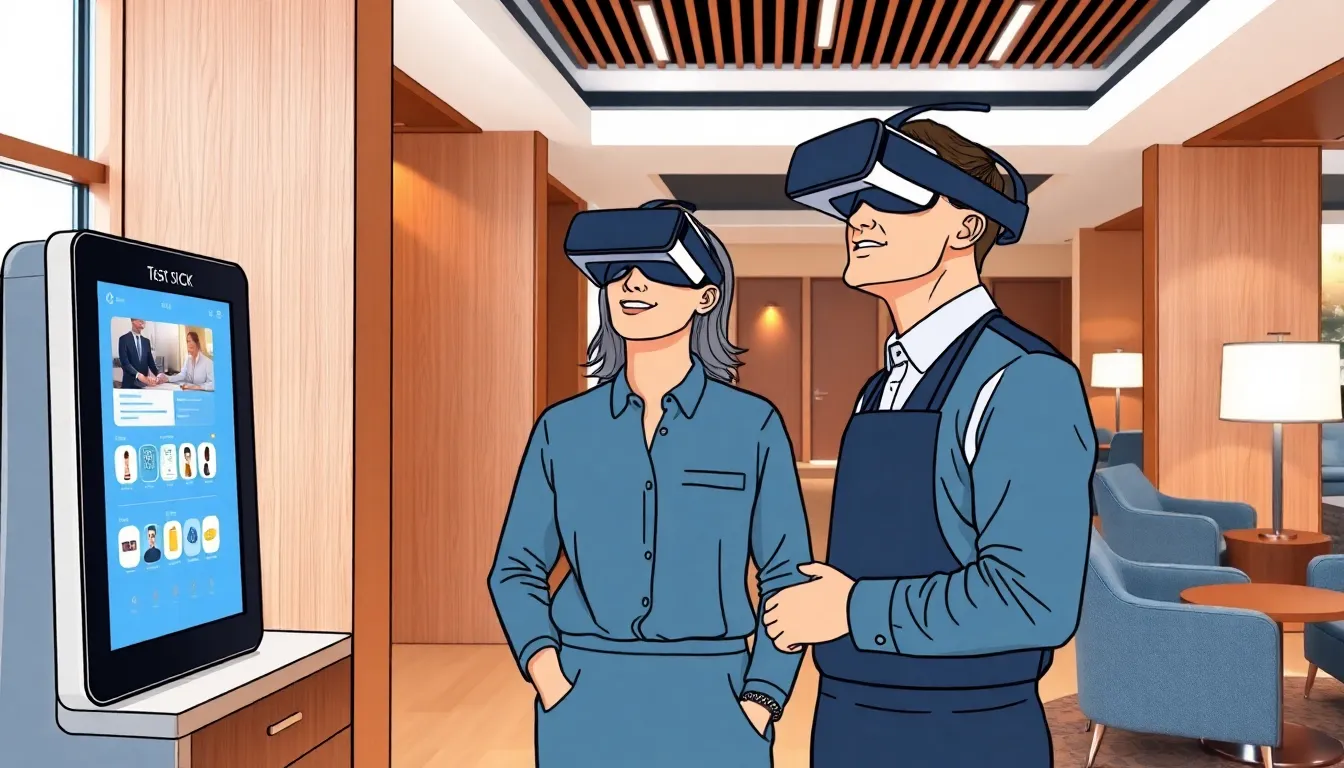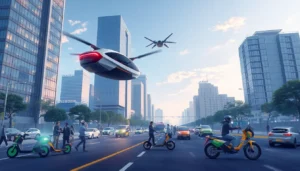Imagine checking into a hotel where the front desk clerk remembers your name, favorite drink, and even your preferred pillow type. Sounds like a scene from a sci-fi movie, right? Welcome to the world of artificial intelligence in the hospitality industry, where robots and algorithms are transforming the way travelers experience comfort and convenience.
Table of Contents
ToggleOverview Of Artificial Intelligence In Hospitality Industry
Artificial intelligence significantly transforms the hospitality industry by streamlining operations and enhancing guest experiences. Many hotels utilize chatbots for instant customer service, providing answers to queries 24/7. Algorithms analyze guest data, enabling personalized recommendations based on preferences.
In-room technology introduces voice-activated systems, allowing guests to control lighting and temperature effortlessly. Machine learning identifies patterns in customer behavior, optimizing marketing strategies. Real-time analytics improves inventory management, ensuring adequate stock levels for dining and service needs.
Self-service kiosks enhance check-in and check-out experiences, reducing wait times and increasing efficiency. Predictive maintenance tools alert staff to equipment issues before they affect operations, ensuring smooth service.
AI-driven platforms also facilitate dynamic pricing, adjusting rates based on demand fluctuations. The integration of virtual reality offers immersive property tours, allowing potential guests to explore amenities before booking.
Staff scheduling software uses AI for optimizing workforce management, balancing labor costs and service quality. Advanced sentiment analysis technology monitors guest feedback across platforms, offering actionable insights for management.
AI in hospitality fosters not just efficiency but also excellence in service delivery. By harnessing technology, the industry continues to adapt in a competitive landscape.
Benefits Of Artificial Intelligence In Hospitality

Artificial intelligence brings numerous benefits to the hospitality industry, enhancing operations and customer satisfaction.
Enhanced Customer Experience
Personalization takes center stage in guest interactions. Hotels leverage AI algorithms to tailor recommendations based on individual preferences, ensuring that guests feel valued. Chatbots serve as virtual assistants, providing instant replies to inquiries around the clock. Voice-activated systems allow guests to control their environment, enhancing convenience in their rooms. Moreover, virtual reality enables immersive property tours, helping potential guests visualize their experiences before booking. Advanced sentiment analysis tools capture and analyze guest feedback, allowing management to respond promptly to concerns or suggestions.
Operational Efficiency
Streamlining operations occurs through AI technology. Self-service kiosks expedite check-in and check-out processes, reducing wait times significantly. Predictive maintenance tools identify equipment issues before they escalate, minimizing downtime and service disruptions. Dynamic pricing models adjust rates based on real-time demand, optimizing revenue for hotels. Furthermore, staff scheduling software utilizes AI to manage workforce allocation effectively, ensuring adequate staffing during peak times. Real-time analytics enhance inventory management, leading to better resource utilization and waste reduction. Implementing these AI-driven solutions allows hospitality businesses to operate more efficiently and competitively.
Applications Of Artificial Intelligence In Hospitality
Artificial intelligence significantly enhances various aspects of the hospitality industry. Its applications streamline operations and elevate guest experiences.
Chatbots And Virtual Assistants
Chatbots provide 24/7 customer support, answering inquiries quickly and accurately. They assist with booking reservations, addressing complaints, and providing recommendations. Virtual assistants improve in-room experiences by allowing guests to control lighting, temperature, and entertainment with voice commands. These technologies reduce the workload on staff, allowing them to focus on personalized guest interactions.
Predictive Analytics
Predictive analytics helps hotels forecast demand and optimize pricing strategies. By analyzing historical data, AI identifies trends and customer behaviors, enabling tailored marketing campaigns. This approach allows properties to adjust pricing dynamically based on current occupancy levels and market conditions. Effective forecasts lead to increased revenue through better resource allocation and inventory management.
Smart Automation
Smart automation streamlines tasks such as check-in and check-out processes, enhancing operational efficiency. Self-service kiosks expedite guest interactions, reducing wait times significantly. Additionally, AI-driven scheduling software optimizes staff assignments, ensuring adequate coverage during peak times. Overall, automation improves service delivery, allowing staff to prioritize guest needs effectively.
Challenges And Considerations
Artificial intelligence in the hospitality industry presents challenges that require careful consideration. Among these, data privacy stands out as a significant issue.
Data Privacy Concerns
Data privacy concerns arise when collecting and analyzing guest information. Hotels often gather sensitive data to personalize experiences, but this practice raises questions about confidentiality. Guests expect their information to remain secure, and any breach could damage trust. Compliance with regulations such as GDPR remains essential while implementing AI solutions. Failure to establish robust data protection measures can lead to legal repercussions and financial losses. Balancing personalization and privacy requires a strategic approach, ensuring guests feel safe while benefiting from AI-driven services.
Implementation Costs
Implementation costs present another challenge for hotels integrating AI technology. Initial investments in systems, software, and training can be substantial. Costs associated with hiring skilled personnel to manage AI tools also contribute to the financial burden. Although AI can streamline operations and increase revenue, hotels must consider their budgets carefully. Smaller establishments may struggle to absorb these expenses, limiting their ability to compete with larger chains. Long-term financial planning, including evaluating return on investment, is crucial for sustainable implementation of AI technologies.
Future Trends In Artificial Intelligence In Hospitality Industry
Artificial intelligence continues to evolve, shaping various sectors, including hospitality. Adoption of AI-powered smart devices is expected to rise, enhancing guest comfort through tailored experiences. Voice-activated assistants in hotel rooms will likely become standard, allowing guests to customize their environment effortlessly.
In addition, AI-driven analytics will play a crucial role in refining marketing efforts. Hotels may implement sophisticated algorithms that predict guest preferences based on past behavior. These insights enable targeted campaigns that resonate with potential customers.
Remote check-in and check-out options will gain traction, minimizing wait times and improving guest satisfaction. With automated systems, travelers can enjoy a seamless arrival and departure experience, ultimately enhancing overall convenience.
Robots may take on various tasks within hotels, from delivering room service to cleaning public areas. This technology not only cuts labor costs but also provides consistent service quality. As AI technology progresses, it’s likely that reliance on human staff will shift towards complex interactions requiring emotional intelligence.
Dynamic pricing models are expected to become more prevalent. Algorithms that adjust pricing based on real-time demand can optimize occupancy rates and maximize revenue. Implementing such strategies will empower hotels to respond swiftly to market fluctuations.
Lastly, enhanced data security measures will emerge as a top priority. With growing concerns about data privacy, hotels must invest in robust protection technologies to build guest trust. By addressing these challenges, establishments can move forward confidently in integrating AI solutions.
Artificial intelligence is reshaping the hospitality industry in profound ways. By enhancing guest experiences and streamlining operations, AI is becoming an indispensable tool for hotels and resorts. The future promises even more integration of smart technologies that will redefine how guests interact with their environment.
As AI continues to evolve, its ability to personalize services and optimize efficiency will only grow. However, the industry must also prioritize data security to maintain guest trust. Embracing these advancements will be crucial for hospitality businesses aiming to stay competitive in a rapidly changing landscape. The journey toward a more intelligent hospitality experience has just begun.




